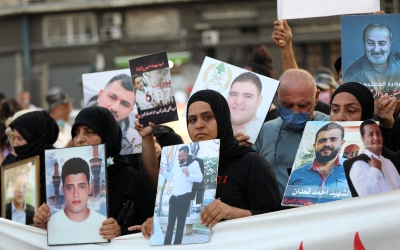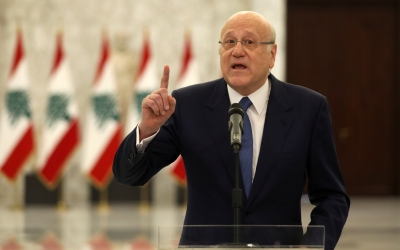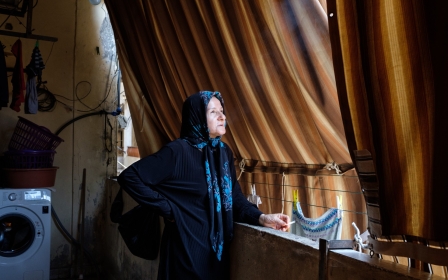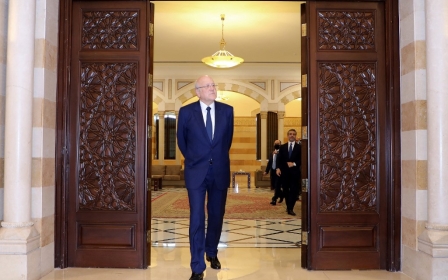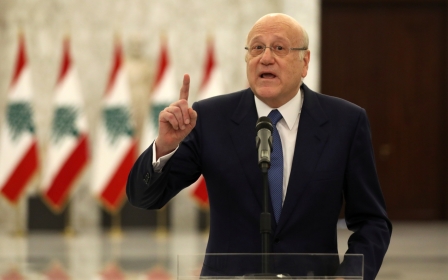Lebanon: EU parliament threatens sanctions for ‘man-made disaster’
The European Union has called Lebanon’s crisis a “man-made disaster” and vows to keep sanctions on the table if Lebanese politicians block the progress of the country’s new government.
On Thursday, the European Parliament in Strasbourg issued a resolution saying EU governments cannot yet release pressure on the country, taking note of Lebanon's formation of a government last week, after more than a year of political deadlock.
The parliament voted overwhelmingly in favour for the non-binding resolution, with 575 for, 71 against and 39 abstentions.
The parliament "deeply urges Lebanese leaders to keep their promises and be a functional government", the parliament's resolution said of Lebanon's new government, which has vowed to tackle one of the world's worst economic meltdowns in history.
“The introduction of targeted sanctions for obstructing or undermining the democratic political process remains an option,” EU lawmakers said.
The resolution comes after EU foreign policy chief Josep Borrell Fontelles stated that the moment for sanctions on Lebanon had passed because politicians had managed to form a government.
However, EU lawmakers say they want to hold Lebanese politicians accountable for the “man-made disaster caused by a handful of men across the ruling political class," many of whom have assets in the EU.
They also called for humanitarian aid to bypass the government and be channelled directly to those in need, given the “extremely high level of mismanagement” over relief funds delivered to Lebanon in the past, according to a Human Rights Watch report.
After successfully spearheading the resolution, parliamentarian Christophe Grudler tweeted that Europe was sending a strong message that, “we are not letting the Lebanese down!”
“Europe must show its support for the Lebanese people, and demand an example from the Lebanese leaders and an end to corruption,” the Renew Europe lawmaker said earlier this week on Twitter.
Worst global crisis
The formation of a new government in Lebanon - led by Najib Mikati - was agreed on 10 September, after more than a year of political paralysis in the country.
But for more than a year, Lebanon had been run by a caretaker government, after then-prime minister Hassan Diab and his cabinet resigned en masse on 10 August 2020 in the wake of the Beirut port explosion that devastated entire neighbourhoods of the Lebanese capital and killed over 210 people.
According to the World Bank, the economic and financial crisis in Lebanon is likely to “rank in the top 10, possibly top 3, most severe crises episodes globally since the mid-19th century.”
Earlier this month, the United Nations found that more than 80 percent of the population now suffers from multi-dimensional poverty, lacking access to basic rights including health, education, water, and food.
As the country faces severe fuel shortages, Lebanon’s Hezbollah sidestepped the government and secured shipments of Iranian fuel.
The Iranian-backed group's al-Manar TV said on Thursday that a convoy of at least 20 tanker trucks carrying Iranian fuel had already entered Lebanon from Syria.
Sources from Hezbollah told Middle East Eye that 80 trucks carrying 50 tonnes of diesel oil each would cross into Lebanon in the next 24 hours.
The oil trucks would use the illegal crossing of al-Shawaghir, located in the Lebanese village of Hosh el Sayed Ali, to transport the oil from Syria, they added.
Hezbollah MP Hassan Fadlallah called the project a "humanitarian initiative... to ease the Lebanese people’s suffering, which has increased due to the US blockade on external monetary transfers as well as foreign aid from entering the country."
Middle East Eye propose une couverture et une analyse indépendantes et incomparables du Moyen-Orient, de l’Afrique du Nord et d’autres régions du monde. Pour en savoir plus sur la reprise de ce contenu et les frais qui s’appliquent, veuillez remplir ce formulaire [en anglais]. Pour en savoir plus sur MEE, cliquez ici [en anglais].


